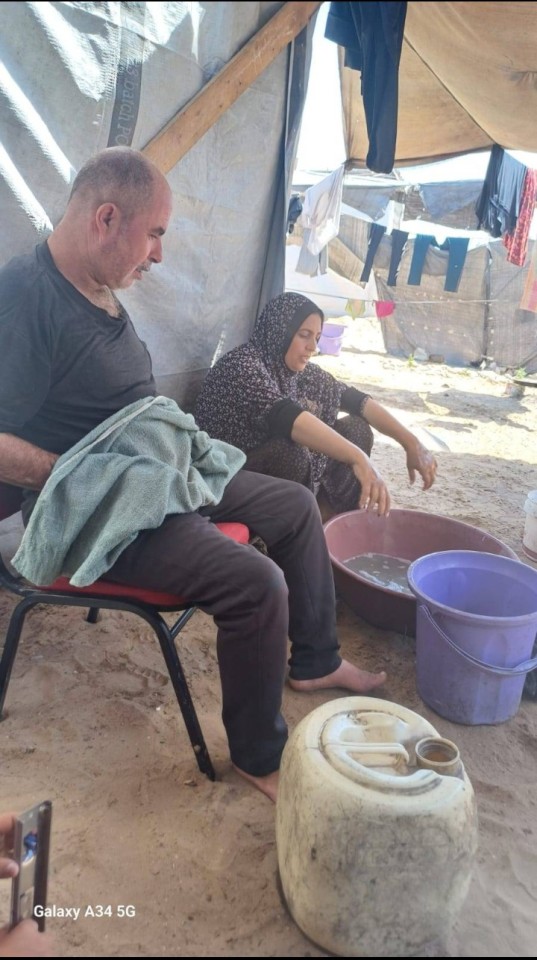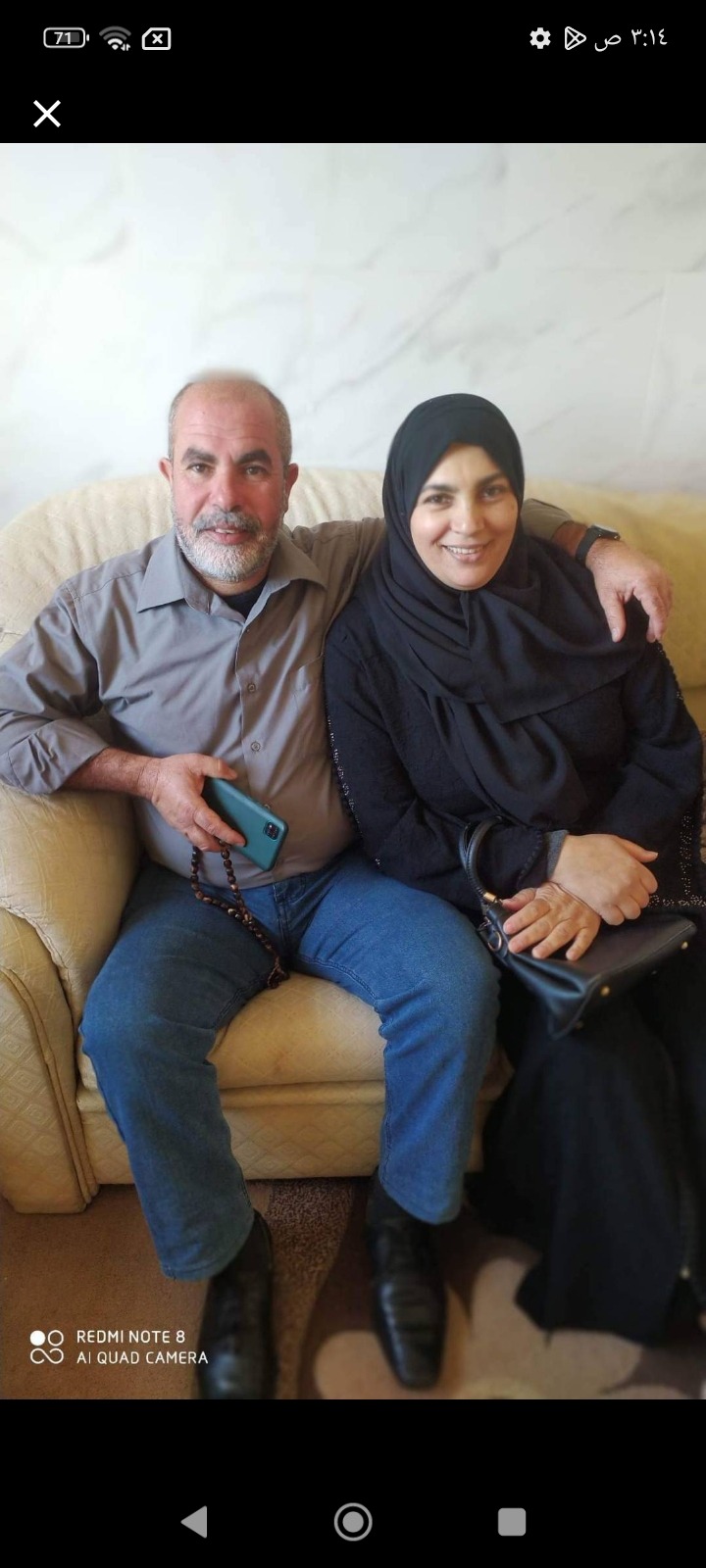Hello, My Name Is Nabil. I Am 50 Years Old, Married, And Responsible For 4 Children. I Am Also Responsible
Hello, my name is Nabil. I am 50 years old, married, and responsible for 4 children. I am also responsible for my grandchildren, who are 4 children. After their mother and father were martyred in the war, and while we were escaping from the bombing in the Shuja'iya neighborhood, and the destruction of my house, we fled to Al-Shifa Hospital, and then to Rafah, to Khan Yunis, and now we are displaced from one place to another. There is no safe place. My daughter was studying in the field of nursing and dreamed of working and completing her life in this field, but the war destroyed everything and there is nothing that would motivate me to stay in Gaza. I am trying to save the future of my children and grandchildren and complete their lives, and I fear that I will spend my whole life looking at them with regret or bemoaning the loss of their lives, so I am creating this campaign to help me get out of Gaza to Egypt with the help of my daughter’s husband who lives in Europe. This is a message from me to everyone who reads my story. Look at us kindly. I look to you with hope and confidence to help me. Please feel free to help by donating or posting. thank you all.





More Posts from Robinwaaaaa and Others


Behold…Chipspeech (colourised)

TAG! You're it!
"NASA’s OSIRIS-REx is the first U.S. mission to successfully collect a sample from an asteroid. On Oct. 20, 2020, the spacecraft briefly touched down on Bennu, an asteroid more than 200 million miles from Earth, and grabbed dust and rocks from a sample site called Nightingale."

The Chipspeech discord server has been nothing but chaos for nearly a year straight. Bert and Rotten are there. We do not know peace.

james webb space autism

Mariner 10 (03/11/1973 - 24/03/1975)
![[04/10/1957] — Бип...бип...бип...](https://64.media.tumblr.com/4ab6789d3f2f51243f858749c2903941/1e758b4579229713-94/s500x750/0518bb9cc52b281581cb3f0800ef2f2b7fae9272.png)
[04/10/1957] — Бип...бип...бип...
History changed on October 4, 1957, when the Soviet Union successfully launched Sputnik 1, the world's first artificial satellite. It was around the size of a beach ball, weighed 83.6 kg (183.9 pounds), and took about 98 minutes to orbit Earth on its elliptical path. This ushered in a new age of political, military, technological, and scientific developments, and although the Sputnik launch was a single event, it marked the start of the space age and the U.S.-U.S.S.R space race.
See the Universe in a New Way with the Webb Space Telescope's First Images
Are you ready to see unprecedented, detailed views of the universe from the James Webb Space Telescope, the largest and most powerful space observatory ever made? Scroll down to see the first full-color images and data from Webb. Unfold the universe with us. ✨
Carina Nebula

This landscape of “mountains” and “valleys” speckled with glittering stars, called the Cosmic Cliffs, is the edge of the star-birthing Carina Nebula. Usually, the early phases of star formation are difficult to capture, but Webb can peer through cosmic dust—thanks to its extreme sensitivity, spatial resolution, and imaging capability. Protostellar jets clearly shoot out from some of these young stars in this new image.
Southern Ring Nebula

The Southern Ring Nebula is a planetary nebula: it’s an expanding cloud of gas and dust surrounding a dying star. In this new image, the nebula’s second, dimmer star is brought into full view, as well as the gas and dust it’s throwing out around it. (The brighter star is in its own stage of stellar evolution and will probably eject its own planetary nebula in the future.) These kinds of details will help us better understand how stars evolve and transform their environments. Finally, you might notice points of light in the background. Those aren’t stars—they’re distant galaxies.
Stephan’s Quintet

Stephan’s Quintet, a visual grouping of five galaxies near each other, was discovered in 1877 and is best known for being prominently featured in the holiday classic, “It’s a Wonderful Life.” This new image brings the galaxy group from the silver screen to your screen in an enormous mosaic that is Webb’s largest image to date. The mosaic covers about one-fifth of the Moon’s diameter; it contains over 150 million pixels and is constructed from almost 1,000 separate image files. Never-before-seen details are on display: sparkling clusters of millions of young stars, fresh star births, sweeping tails of gas, dust and stars, and huge shock waves paint a dramatic picture of galactic interactions.
WASP-96 b

WASP-96 b is a giant, mostly gas planet outside our solar system, discovered in 2014. Webb’s Near-Infrared Imager and Slitless Spectrograph (NIRISS) measured light from the WASP-96 system as the planet moved across the star. The light curve confirmed previous observations, but the transmission spectrum revealed new properties of the planet: an unambiguous signature of water, indications of haze, and evidence of clouds in the atmosphere. This discovery marks a giant leap forward in the quest to find potentially habitable planets beyond Earth.
Webb's First Deep Field

This image of galaxy cluster SMACS 0723, known as Webb’s First Deep Field, looks 4.6 billion years into the past. Looking at infrared wavelengths beyond Hubble’s deepest fields, Webb’s sharp near-infrared view reveals thousands of galaxies—including the faintest objects ever observed in the infrared—in the most detailed view of the early universe to date. We can now see tiny, faint structures we’ve never seen before, like star clusters and diffuse features and soon, we’ll begin to learn more about the galaxies’ masses, ages, histories, and compositions.
These images and data are just the beginning of what the observatory will find. It will study every phase in the history of our Universe, ranging from the first luminous glows after the Big Bang, to the formation of solar systems capable of supporting life on planets like Earth, to the evolution of our own Solar System.
Make sure to follow us on Tumblr for your regular dose of space—and for milestones like this!
Credits: NASA, ESA, CSA, and STScI

Omineptune’s “Conch”
-
 beliese reblogged this · 8 months ago
beliese reblogged this · 8 months ago -
 sordidmasterpiece reblogged this · 8 months ago
sordidmasterpiece reblogged this · 8 months ago -
 sordidmasterpiece reblogged this · 8 months ago
sordidmasterpiece reblogged this · 8 months ago -
 lightlysaltedcrisp reblogged this · 8 months ago
lightlysaltedcrisp reblogged this · 8 months ago -
 lightlysaltedcrisp liked this · 8 months ago
lightlysaltedcrisp liked this · 8 months ago -
 yesitsanusha reblogged this · 10 months ago
yesitsanusha reblogged this · 10 months ago -
 beachyserasims liked this · 11 months ago
beachyserasims liked this · 11 months ago -
 soarrenbluejay reblogged this · 11 months ago
soarrenbluejay reblogged this · 11 months ago -
 soarrenbluejay liked this · 11 months ago
soarrenbluejay liked this · 11 months ago -
 melocosmos reblogged this · 11 months ago
melocosmos reblogged this · 11 months ago -
 melocosmos liked this · 11 months ago
melocosmos liked this · 11 months ago -
 yesitsanusha reblogged this · 11 months ago
yesitsanusha reblogged this · 11 months ago -
 jellyfishhhhhhhhhhh reblogged this · 11 months ago
jellyfishhhhhhhhhhh reblogged this · 11 months ago -
 jellyfishhhhhhhhhhh liked this · 11 months ago
jellyfishhhhhhhhhhh liked this · 11 months ago -
 bittersnsweetz liked this · 11 months ago
bittersnsweetz liked this · 11 months ago -
 bhonn4eus liked this · 11 months ago
bhonn4eus liked this · 11 months ago -
 athena5898 reblogged this · 11 months ago
athena5898 reblogged this · 11 months ago -
 yesitsanusha reblogged this · 11 months ago
yesitsanusha reblogged this · 11 months ago -
 lapelle-du-bubblegum-vide reblogged this · 11 months ago
lapelle-du-bubblegum-vide reblogged this · 11 months ago -
 manir01 liked this · 11 months ago
manir01 liked this · 11 months ago -
 tatsuki-fujimoto-dick-rider reblogged this · 11 months ago
tatsuki-fujimoto-dick-rider reblogged this · 11 months ago -
 tatsuki-fujimoto-dick-rider liked this · 11 months ago
tatsuki-fujimoto-dick-rider liked this · 11 months ago -
 no-name-is-me liked this · 11 months ago
no-name-is-me liked this · 11 months ago -
 fuck-the-gender reblogged this · 11 months ago
fuck-the-gender reblogged this · 11 months ago -
 fuck-the-gender liked this · 11 months ago
fuck-the-gender liked this · 11 months ago -
 yesitsanusha reblogged this · 11 months ago
yesitsanusha reblogged this · 11 months ago -
 trekwiz reblogged this · 11 months ago
trekwiz reblogged this · 11 months ago -
 trekwiz liked this · 11 months ago
trekwiz liked this · 11 months ago -
 wren-kitchens reblogged this · 11 months ago
wren-kitchens reblogged this · 11 months ago -
 you-beat-that-username reblogged this · 11 months ago
you-beat-that-username reblogged this · 11 months ago -
 yesitsanusha reblogged this · 11 months ago
yesitsanusha reblogged this · 11 months ago -
 yesitsanusha reblogged this · 11 months ago
yesitsanusha reblogged this · 11 months ago -
 alittleannihilati0n reblogged this · 11 months ago
alittleannihilati0n reblogged this · 11 months ago -
 robinwaaaaa reblogged this · 11 months ago
robinwaaaaa reblogged this · 11 months ago -
 stickerbrush reblogged this · 11 months ago
stickerbrush reblogged this · 11 months ago -
 yesitsanusha reblogged this · 11 months ago
yesitsanusha reblogged this · 11 months ago -
 murderbot reblogged this · 11 months ago
murderbot reblogged this · 11 months ago -
 jezior0 reblogged this · 11 months ago
jezior0 reblogged this · 11 months ago -
 jezior0 liked this · 11 months ago
jezior0 liked this · 11 months ago -
 frustrated-froglet-archive reblogged this · 11 months ago
frustrated-froglet-archive reblogged this · 11 months ago -
 crypticgi liked this · 11 months ago
crypticgi liked this · 11 months ago -
 b-u-n-n-i reblogged this · 11 months ago
b-u-n-n-i reblogged this · 11 months ago

Call me Robin! I draw robots and stuff! A spacecraft fandom blog for the most part. 📍Shanghai, boring person extraordinaire, 中文/English, he/she. https://linktr.ee/RobinW
262 posts

